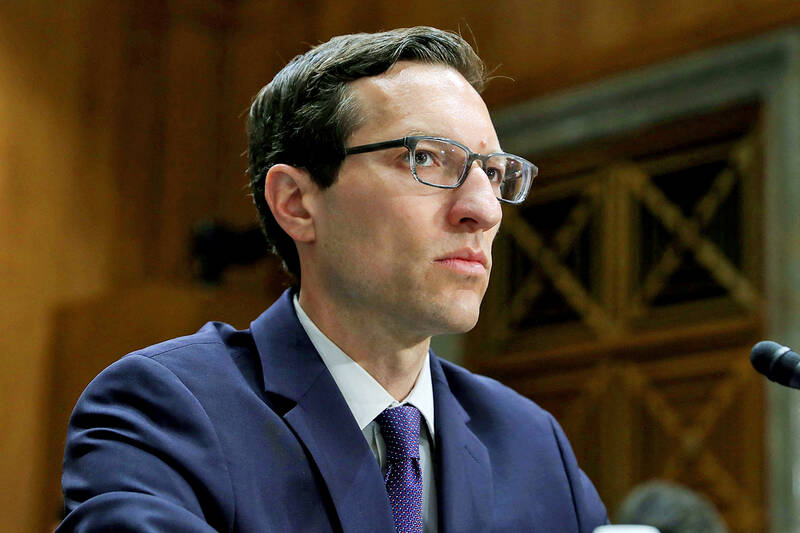Open communication channels between the US and China are important in maintaining peace and stability across the Taiwan Strait, US Assistant Secretary of Defense for Indo-Pacific Affairs Ely Ratner said on Thursday.
Ratner made the remark at an event held by the Washington-based Center for Strategic and International Studies to discuss the US’ role in Indo-Pacific security.
The event was held prior to US Secretary of Defense Lloyd Austin’s planned trip to Japan, Singapore, India and France next week, which includes attending the 20th Shangri-La Dialogue in Singapore, the US Department of Defense said in a press release on Thursday.

Photo: Reuters
Deterring China does not only involve the defense capabilities of the US and its allies, but also the types of interaction between the US and China, where communication is “an important ingredient to maintain peace,” Ratner said.
Austin has repeatedly underlined the importance of open lines of communication with Beijing to prevent misperception and miscalculation during peacetime or crisis, he said.
US officials, such as Austin, US Joint Chiefs of Staff Chairman General Mark Milley and US Indo-Pacific Commander Admiral John Aquilino, have proposed telephone calls, meetings and dialogue with Beijing, but has “repeatedly have had those requests rejected or not answered,” he said.
The US and the department “have had an outstretched hand on this question of military-to-military engagement and we have yet to have had a consistently willing partner,” he said.
For example, several weeks ago, Austin and the department initiated requests to meet with Chinese Minister of National Defense Li Shangfu (李尚福) at the Shangri-La Dialogue, which “has not been answered one way or another,” he said.
China said that Li has been sanctioned under the Countering America’s Adversaries Through Sanctions Act, but the sanction has “no legal or technical bearing on” the meeting, Ratner said.
The US often experiences difficulties in leveraging the communication channels with China, which is “often shifting from one reason to another as to why at any particular moment it is inopportune or inconvenient,” he said.
Regarding US commitment to Taiwan, Ratner said that Washington has “a clear objective to maintain the ‘status quo’ in the Taiwan Strait” as it believes that to be in the best interests of the entire region.
Under the Taiwan Relations Act, the US is committed to providing Taiwan with the defensive arms it needs to defend itself and maintaining its own capacity to resist coercive efforts, he said.
“Conflict across the Strait is either inevitable or imminent,” as the US is confident that “deterrence is real, and deterrence is strong,” he said.
“Our job is to keep it that way tomorrow. Next week, next year and then of the future,” he added.

Alain Robert, known as the "French Spider-Man," praised Alex Honnold as exceptionally well-prepared after the US climber completed a free solo ascent of Taipei 101 yesterday. Robert said Honnold's ascent of the 508m-tall skyscraper in just more than one-and-a-half hours without using safety ropes or equipment was a remarkable achievement. "This is my life," he said in an interview conducted in French, adding that he liked the feeling of being "on the edge of danger." The 63-year-old Frenchman climbed Taipei 101 using ropes in December 2004, taking about four hours to reach the top. On a one-to-10 scale of difficulty, Robert said Taipei 101

Nipah virus infection is to be officially listed as a category 5 notifiable infectious disease in Taiwan in March, while clinical treatment guidelines are being formulated, the Centers for Disease Control (CDC) said yesterday. With Nipah infections being reported in other countries and considering its relatively high fatality rate, the centers on Jan. 16 announced that it would be listed as a notifiable infectious disease to bolster the nation’s systematic early warning system and increase public awareness, the CDC said. Bangladesh reported four fatal cases last year in separate districts, with three linked to raw date palm sap consumption, CDC Epidemic Intelligence

Two Taiwanese prosecutors were questioned by Chinese security personnel at their hotel during a trip to China’s Henan Province this month, the Mainland Affairs Council (MAC) said yesterday. The officers had personal information on the prosecutors, including “when they were assigned to their posts, their work locations and job titles,” MAC Deputy Minister and spokesman Liang Wen-chieh (梁文傑) said. On top of asking about their agencies and positions, the officers also questioned the prosecutors about the Cross-Strait Joint Crime-Fighting and Judicial Mutual Assistance Agreement, a pact that serves as the framework for Taiwan-China cooperation on combating crime and providing judicial assistance, Liang

US climber Alex Honnold left Taiwan this morning a day after completing a free-solo ascent of Taipei 101, a feat that drew cheers from onlookers and gained widespread international attention. Honnold yesterday scaled the 101-story skyscraper without a rope or safety harness. The climb — the highest urban free-solo ascent ever attempted — took just more than 90 minutes and was streamed live on Netflix. It was covered by major international news outlets including CNN, the New York Times, the Guardian and the Wall Street Journal. As Honnold prepared to leave Taiwan today, he attracted a crowd when he and his wife, Sanni,